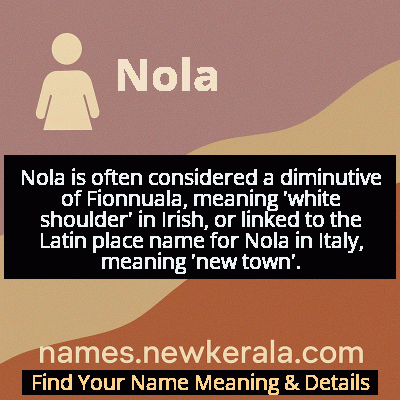Nola Name Meaning & Details
Origin, Popularity, Numerology Analysis & Name Meaning of Nola
Discover the origin, meaning, and cultural significance of the name NOLA. Delve into its historical roots and explore the lasting impact it has had on communities and traditions.
Name
Nola
Gender
Female
Origin
Celtic
Lucky Number
6
Meaning of the Name - Nola
Nola is often considered a diminutive of Fionnuala, meaning 'white shoulder' in Irish, or linked to the Latin place name for Nola in Italy, meaning 'new town'.
Nola - Complete Numerology Analysis
Your Numerology Number
Based on Pythagorean Numerology System
Ruling Planet
Venus
Positive Nature
Harmonious, responsible, caring, and artistic.
Negative Traits
Overly idealistic, superficial, possessive, or jealous.
Lucky Colours
Pink, turquoise.
Lucky Days
Friday.
Lucky Stones
Diamond, turquoise.
Harmony Numbers
2, 3, 9.
Best Suited Professions
Artists, musicians, teachers, healthcare workers.
What People Like About You
Warmth, nurturing nature, artistic flair.
Famous People Named Nola
Nola Ochs
Educator/Record Holder
Oldest college graduate at age 95
Nola Rae
Mime and Physical Comedian
Revolutionized physical theater and won London Fringe Best Actress Award
Nola Gregory
Indigenous Australian Actress
Prominent Indigenous representation in Australian media
Name Variations & International Equivalents
Click on blue names to explore their detailed meanings. Gray names with will be available soon.
Cultural & Historical Significance
Beyond mythology, Nola also connects to the ancient city of Nola in Campania, Italy, which was an important Oscan and later Roman settlement. This dual heritage creates a fascinating cultural bridge, representing the interconnectedness of European civilizations. In modern times, Nola has become a symbol of Celtic diaspora identity, particularly in North America where Irish immigrants often chose the name to maintain cultural connections. The name's evolution from ancient mythological figure to contemporary given name demonstrates the living nature of Celtic cultural traditions and their adaptation to new contexts while preserving essential cultural values and stories.
Extended Personality Analysis
People named Nola typically exhibit a unique blend of creativity and practicality that makes them both dreamers and doers. They often possess strong intuitive abilities and emotional intelligence, allowing them to connect deeply with others and understand complex social dynamics. Their artistic sensibilities frequently manifest in various forms of self-expression, whether through traditional arts, writing, or innovative problem-solving in professional contexts. Nolas are known for their adaptability and resilience, qualities that serve them well in navigating life's challenges while maintaining their core values and identity.
In relationships, Nolas tend to be loyal and supportive friends and partners, valuing deep connections over superficial interactions. They often serve as peacemakers in conflicts, using their diplomatic skills and natural empathy to bridge differences. Their Celtic heritage often gives them a strong connection to nature and tradition, which they balance with a forward-thinking, progressive outlook. Many Nolas demonstrate leadership qualities through inspiration rather than authority, guiding others through example and encouragement. Their combination of traditional wisdom and modern perspective makes them effective in roles that require both respect for heritage and innovation for the future.
Modern Usage & Popularity
In contemporary naming practices, Nola has experienced a remarkable renaissance, transitioning from a relatively obscure Celtic name to a fashionable choice for modern parents. The name's popularity has surged particularly in the last two decades, with significant growth in the United States, United Kingdom, Australia, and Canada. This resurgence aligns with broader trends favoring vintage names and Celtic heritage names, as parents seek distinctive yet meaningful options for their children. Nola's appeal lies in its perfect balance of traditional roots and contemporary sound - it's short, melodic, and easy to pronounce while carrying deep cultural significance. The name currently ranks within the top 500 names in several English-speaking countries and shows continued upward momentum. Its popularity is particularly strong among educated, urban parents who value both cultural heritage and modern aesthetics, making Nola a prime example of how traditional names can find new life in the 21st century.
Symbolic & Spiritual Meanings
Symbolically, Nola represents the enduring power of transformation and cultural continuity. Drawing from its mythological origins, the name embodies the concept of metamorphosis - the ability to change form while maintaining essential identity, much like Fionnuala's transformation from human to swan in Celtic legend. This symbolism extends to personal growth and adaptation in modern contexts, representing the human capacity to evolve while staying true to one's roots. The name also carries connotations of grace under pressure, reflecting the swan's elegant navigation of different elements.
Metaphorically, Nola symbolizes the bridge between ancient wisdom and contemporary life, serving as a reminder that cultural heritage can inform modern identity without limiting it. The name's connection to both Celtic mythology and historical European geography represents the interconnectedness of human experience across time and space. In a broader sense, Nola embodies the idea that names carry not just personal identity but collective memory and cultural narrative, making each bearer part of a larger story that spans generations and continents.

